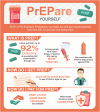Black Adolescent Females' Perceptions of PrEP for HIV Risk Reduction
- PMID: 37853731
- PMCID: PMC10588402
- DOI: 10.1177/23259582231206934
Black Adolescent Females' Perceptions of PrEP for HIV Risk Reduction
Abstract
Preexposure prophylaxis (PrEP) for human immunodeficiency virus (HIV) prevention is approved for use in adolescents, though uptake remains low. Black adolescent females experience higher rates of HIV transmission compared to adolescent females of other racial/ethnic groups. Increasing PrEP awareness and education among this population may be an effective strategy to mitigate disparities in HIV transmission among Black adolescent females. Twenty-seven Black adolescent females participated in focus groups which were coded using the constant comparative method of qualitative analysis to identify major themes: (1) PrEP is not commonly framed as an HIV prevention strategy for heterosexual Black adolescent females, (2) PrEP use among peers is perceived as mostly positive, (3) Adoption of PrEP among Black adolescent females is impeded by perceived barriers such as stigma, negative side effects, and adherence concerns. These findings may inform the development of targeted culturally tailored marketing and educational campaigns centered on Black heterosexual adolescent females to increase PrEP awareness and uptake in this population disproportionately affected by HIV.
Trial registration: ClinicalTrials.gov NCT04108988.
Keywords: Black; adolescent; focus group; human immunodeficiency virus; preexposure prophylaxis; prevention; qualitative.
Conflict of interest statement
Declaration of Conflicting InterestsDr. Hieftje is the Principal Investigator for this study and has a significant relationship with the videogame prototype company, PreviewLabs, Inc. that is currently developing the videogame intervention based on the findings of this research study. All other authors declare that they have no conflicts of interest with respect to the research, authorship, and/or publication of this article.
References
-
- Centers for Disease Control and Prevention. HIV Surveillance Report, 20202020; vol. 3333. Published May 2022. http://www.cdc.gov/hiv/library/reports/hiv-surveillance.html.
-
- McCree DH, Jeffries WL, Beer L, Gant Z, Elmore K, Sutton M. Exploring factors associated with declining HIV diagnoses among African American females. J Racial Ethn Health Disparities. 2018;5(3):598–604. - PubMed
-
- Jones R, Hoover DR, Lacroix LJ, Garvey CM. Correlates of HIV transmission behaviors and HIV testing in predominately African American/Black women with high-risk male sex partners. AIDS Behav. 2020;24(6):1876–1892. - PubMed
-
- Randolph SD, Golin C, Welgus H, Lightfoot AF, Harding CJ, Riggins LF. How perceived structural racism and discrimination and medical mistrust in the health system influences participation in HIV health services for Black women living in the United States South: a qualitative, descriptive study. J Assoc Nurses AIDS Care. 2020;31(5):598–605. - PubMed
Publication types
MeSH terms
Substances
Associated data
Grants and funding
LinkOut - more resources
Full Text Sources
Medical
Miscellaneous


